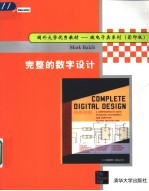图书介绍
完整的数字设计PDF|Epub|txt|kindle电子书版本网盘下载

- (美)鲍尔奇(Balch,M.)著 著
- 出版社: 北京:清华大学出版社
- ISBN:7302077312
- 出版时间:2004
- 标注页数:460页
- 文件大小:65MB
- 文件页数:480页
- 主题词:数字电路-电路设计-高等学校-教材-英文
PDF下载
下载说明
完整的数字设计PDF格式电子书版下载
下载的文件为RAR压缩包。需要使用解压软件进行解压得到PDF格式图书。建议使用BT下载工具Free Download Manager进行下载,简称FDM(免费,没有广告,支持多平台)。本站资源全部打包为BT种子。所以需要使用专业的BT下载软件进行下载。如BitComet qBittorrent uTorrent等BT下载工具。迅雷目前由于本站不是热门资源。不推荐使用!后期资源热门了。安装了迅雷也可以迅雷进行下载!
(文件页数 要大于 标注页数,上中下等多册电子书除外)
注意:本站所有压缩包均有解压码: 点击下载压缩包解压工具
图书目录
PART 1 Digital Fundamentals1
Chapter 1 Digital Logic3
1.1 Boolean Logic3
1.2 Boolean Manipulation7
1.3 The Karnaugh map8
1.4 Binary and Hexadecimal Numbering10
1.5 Binary Addition14
1.6 Subtraction and Negative Numbers15
1.7 Multiplication and Division17
1.8 Flip-Flops and Latches18
1.9 Synchronous Logic21
1.10 Synchronous Timing Analysis23
1.11 Clock Skew25
1.12 Clock Jitter27
1.13 Derived Logical Building Blocks28
Chapter 2 Integrated Circuits and the 7400 Logic Families33
2.1 The Integrated Circuit33
2.2 IC Packaging38
2.3 The 7400-Series Discrete Logic Family41
2.4 Applying the 7400 Family to Logic Design43
2.5 Synchronous Logic Design with the 7400 Family45
2.6 Common Variants of the 7400 Family50
2.7 Interpreting a Digital IC Data Shect51
Chapter 3 Basic Computer Architecture55
3.1 The Digital Computer56
3.2 Microprocessor Internals58
3.3 Subroutines and the Stack60
3.4 Reset and Interrupts62
3.5 Implementation of an Eight-Bit Computer63
3.6 Address Banking67
3.7 Direct Memory Access68
3.8 Extending the Microprocessor Bus70
3.9 Assembly Language and Addressing Modes72
Chapter 4 Memory77
4.1 Memory Classifications77
4.2 EPROM79
4.3 Flash Memory81
4.4 EEPROM85
4.5 Asynchronous SRAM86
4.6 Asynchronous DRAM88
4.7 Multiport Memory92
4.8 The FIFO94
Chapter 5 Serial Communications97
5.1 Serial vs.Parallel Communication98
5.2 The UART99
5.3 ASCII Data Representation102
5.4 RS-232102
5.5 RS-422107
5.6 Modems and Baud Rate108
5.7 Network Topologies109
5.8 Network Data Formats110
5.9 RS-485112
5.10 A Simple RS-485 Network114
5.11 Interchip Serial Communications117
Chapter 6 Instructive Microprocessors and Microcomputer Elements121
6.1 Evolution121
6.2 Motorola 6800 Eight-bit Microprocessor Family122
6.3 Intel 8051 Microcontroller Family125
6.4 Microchip PIC? Microcontroller Family131
6.5 Intel 8086 16-Bit Microprocessor Family134
6.6 Motorola 68000 16/32-Bit Microprocessor Family139
PART 2 Advanced Digital Systems143
7.1 RISC and CISC145
Chapter 7 Advanced Microprocessor Concepts145
7.2 Cache Structures149
7.3 Caches in Practice154
7.4 Virtual Memory and the MMU158
7.5 Superpipelined and Superscalar Architectures161
7.6 Floating-Point Arithmetic165
7.7 Digital Signal Processors167
7.8 Performance Metrics169
Chapter 8 High-Performance Memory Technologies173
8.1 Synchronous DRAM173
8.2 Double Data Rate SDRAM179
8.3 Synchronous SRAM182
8.4 DDR and QDR SRAM185
8.5 Content Addressable Memory188
Chapter 9 Networking193
9.1 Protocol Layers One and Two193
9.2 Protocol Layers Three and Four194
9.3 Physical Media197
9.4 Channel Coding198
9.5 8B 1OB Coding203
9.6 Error Detection207
9.7 Checksum208
9.8 Cyclic Redundancy Check209
9.9 Ethernet215
Chapter 10 Logic Design and Finite State Machines221
10.1 Hardware Description Languages221
10.2 CPU Support Logic227
10.3 Clock Domain Crossing233
10.4 Finite State Machines237
10.5 FSM Bus Control239
10.6 FSM Optimization243
10.7 Pipelining245
11.1 Custom and Programmable Logic249
Chapter 11 Programmable Logic Devices249
11.2 GALs and PALs252
11.3 CPLDs255
11.4 FPGAs257
PART 3 Analog Basics for Digital Systems265
Chapter 12 Electrical Fundamentals267
12.1 Basic Circuits267
12.2 Loop and Node Analysis268
12.3 Resistance Combination271
12.4 Capacitors272
12.5 Capacitors as AC Elements274
12.6 Inductors276
12.7 Nonideal RLC Models276
12.8 Frequency Domain Analysis279
12.9 Lowpass and Highpass Filters283
12.10 Transformers288
Chapter 13 Diodes and Transistors293
13.1 Diodes293
13.2 Power Circuits with Diodes296
13.3 Diodes in Digital Applications298
13.4 Bipolar Junction Transistors300
13.5 Digital Amplification with the BJT301
13.6 Logic Functions with the BJT304
13.7 Field-Effect Transistors306
13.8 Power FETs and JFETs309
Chapter 14 Operational Amplifiers311
14.1 The Ideal Up-amp311
14.2 Characteristics of Real Op-amps316
14.3 Bandwidth Limitations324
14.4 Input Resistance325
14.5 Summation Amplifier Circuits328
14.6 Active Filters331
14.7 Comparators and Hysteresis333
Chapter 15 Analog Interfaces for Digital Systems339
15.1 Conversion between Analog and Digital Domains339
15.2 Sampling Rate and Aliasing341
15.3 ADC Circuits345
15.4 DAC Circuits348
15.5 Filters in Data Conversion Systems350
PART 4 Digital System Design in Practice353
Chapter 16 Clock Distribution355
16.1 Crystal Oscillators and Ceramic Resonators355
16.2 Low-Skew Clock Buffers357
16.3 Zero-Delay Buffers:The PLL360
16.4 Frequency Synthesis364
16.5 Delay-Locked Loops366
16.6 Source-Synchronous Clocking367
Chapter 17 Voltage Regulation and Power Distribution371
17.1 Voltage Regulation Basics372
17.2 Thermal Analysis374
17.3 Zener Diodes and Shunt Regulators376
17.4 Transistors and Discrete Series Regulators379
17.5 Linear Regulators382
17.6 Switching Regulators386
17.7 Power Distribution389
17.8 Electrical Integrity392
Chapter 18 Signal Integrity397
18.1 Transmission Lines398
18.2 Termination403
18.3 Crosstalk408
18.4 Electromagnetic Interference410
18.5 Grounding and Electromagnetic Compatibility413
18.6 Electrostatic Discharge415
Chapter 19 Designing for Success419
19.1 Practical Technologies420
19.2 Printed Circuit Boards422
19.3 Manually Wired Circuits425
19.4 Microprocessor Reset428
19.5 Design for Debug429
19.6 Boundary Scan431
19.7 Diagnostic Software433
19.8 Schematic Capture and Spice436
19.9 Test Equipment440
Appendix A Further Education443
Index445